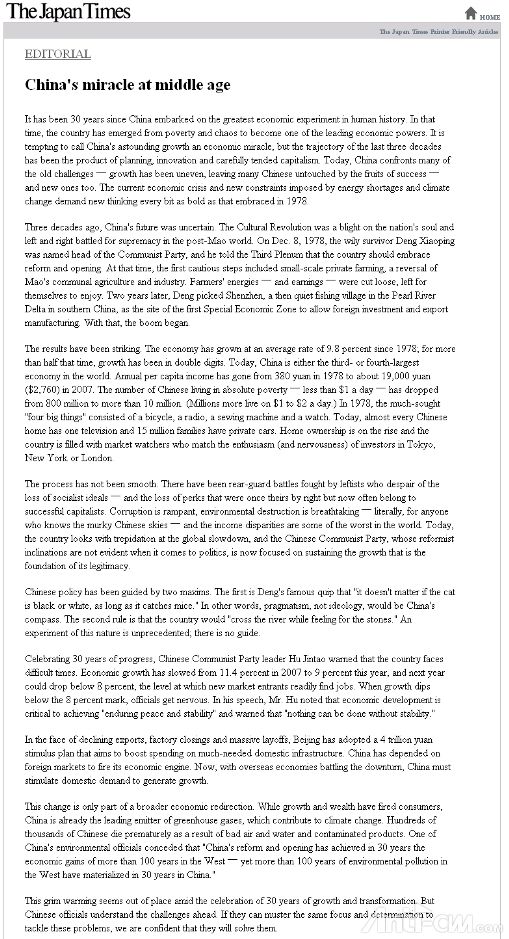【原文标题】China miracle at middle age
【中文标题】中国奇迹人到中年
【登载媒体】theJapanTimes
【来源地址】http://search.japantimes.co.jp/cgi-bin/ed20081228a1.html
【译者】荡漾
【声明】本翻译供Anti-CNN使用,转载请注明译者及出处,谢谢!
【译文】
30年来中国实践了人类历史上最为伟大的经济腾飞,使国家从贫穷和混乱中摆脱出来并摇身成为世界先进经济体之一。因为令人吃惊的发展速度而被称做“经济奇迹”听上去颇为诱人,但实际上三十年来的成就是中国计划、改革创新以及谨慎趋同资本主义的结果。今天的中国需要应对诸多挑战,既有现存的——经济发展的不平衡使得很大一部分中国人无法分享改革成功的果实,也有新来临的:当前的经济危机以及因能源短缺和气候变化产生的新的限制要求中国具备与1978年一样大胆的新的思维。
三十年前的中国前途未卜,文化大革命让中华民族的灵魂饱受怆伤,后毛泽东时代左右阵营展开权力争夺。1978年12月8日老谋深算的幸存者邓小平成为中国共产党的领袖,在三中全会上提出要改革开放。当时提出的小心翼翼的起始步骤包括小规模的私人承包田,这对毛泽东时代公社模式的工农业无异于一次颠覆。农民的积极性得到了激发,收入在上缴部分之后剩余的都归个人所有。两年后邓小平选择了南方珠江三角洲当时一个宁静的小渔村深圳作为第一个允许外商投资以及出口制造业的经济特区,自此中国走上了繁荣之路。
改革开放的成果令人震惊。自1978年来经济年均增长达到9.8%,一半以上的年份里是以两位数的增长率在发展。今天的中国已经发展成世界第三(或第四)大经济体。年人均收入从1978年的380元提高到2007年的19000元;每天不足一美元的绝对贫困人口从8亿减少到1千多万(其中数百万的生活标准在每天1-2美元);1978年大多数中国人追求“四大件”——自行车、收音机、缝纫机和手表,今天几乎每个中国家庭都有一台电视机,1千5百万家庭拥有私家车。拥有房产的人越来越多,这个国家到处都是寻找市场机会的人,他们的热情(和紧张)程度堪比东京、纽约和伦敦的投资客。
改革的进程并非一帆风顺。绝望的左派发起抵抗运动,他们既不愿看到社会主义理想落空,也不愿看到过去由他们特权拥有的好处改由今天成功的资本家们所享有;腐败蔓生加上惊人的环境破坏——实际上是人尽皆知的中国的黑暗面,而收入的差距之大在一定程度上可算世界上最为糟糕。今天的中国在全球经济滑坡中显得忐忑不安,中共改革派的关注焦点显然不在政治上,而是如何维持巩固其执政之基的经济增长。
中国的改革政策有两句座右铭。第一句是邓小平的名言——“管它白猫黑猫,能抓老鼠就是好猫”,表明中国选择了实用主义而非意识形态作为发展的指导方针;第二句是中国“摸着石头过河”,说的是中国的改革开放没有先例,也没有任何可供借鉴的经验。
中共领导人胡锦涛在庆祝改革开放30周年的讲话中语重心长提醒国家面临着困难的时刻。经济增长率由2007年的11.4%降至今年的9%,明年可能降至8%以下。8%的增长率被视为就业者能顺利在市场中寻找到工作的分界线,一旦增长率跌破8%,官方将绷紧神经。胡锦涛在讲话中指出经济发展的当务之急是实现“长期的和平和稳定”并警示“没有稳定什么事情都做不好”。
面对低迷的出口、工厂关闭和大量的失业中国通过了一项4万亿元的刺激计划,旨在推进亟需的国内基础建设。外国市场一直是中国赖以刺激经济的引擎,如今国外经济在低迷中挣扎,中国必须刺激国内需求以促进经济增长。
这种改变只是一方面,中国还将作出更大的经济方向调整。经济增长和财富积累点燃消费者热情的同时中国成为了引起气候变化的温室气体的排放大国。不良的空气和水以及受污染的产品成为数十万中国人过早死亡的原因之一。一位中国环保官员承认“中国改革开放30年来取得了西方国家100多年的经济成果,但也在30年间造成了西方国家100多年的环境污染”。
在庆祝改革和发展30周年的时候提出这种严肃的气候问题似乎有些不合时宜,但中国的官员们明白前途中的挑战。如果能拿出与改革开放相同的关注力和决心,我们有信心他们将解决这些问题。
【原文】
It has been 30 years since China embarked on the greatest economic experiment in human history. In that time, the country has emerged from poverty and chaos to become one of the leading economic powers. It is tempting to call China's astounding growth an economic miracle, but the trajectory of the last three decades has been the product of planning, innovation and carefully tended capitalism. Today, China confronts many of the old challenges — growth has been uneven, leaving many Chinese untouched by the fruits of success — and new ones too. The current economic crisis and new constraints imposed by energy shortages and climate change demand new thinking every bit as bold as that embraced in 1978.
Three decades ago, China's future was uncertain. The Cultural Revolution was a blight on the nation's soul and left and right battled for supremacy in the post-Mao world. On Dec. 8, 1978, the wily survivor Deng Xiaoping was named head of the Communist Party, and he told the Third Plenum that the country should embrace reform and opening. At that time, the first cautious steps included small-scale private farming, a reversal of Mao's communal agriculture and industry. Farmers' energies — and earnings — were cut loose, left for themselves to enjoy. Two years later, Deng picked Shenzhen, a then quiet fishing village in the Pearl River Delta in southern China, as the site of the first Special Economic Zone to allow foreign investment and export manufacturing. With that, the boom began.
The results have been striking. The economy has grown at an average rate of 9.8 percent since 1978; for more than half that time, growth has been in double digits. Today, China is either the third- or fourth-largest economy in the world. Annual per capita income has gone from 380 yuan in 1978 to about 19,000 yuan ($2,760) in 2007. The number of Chinese living in absolute poverty — less than $1 a day — has dropped from 800 million to more than 10 million. (Millions more live on $1 to $2 a day.) In 1978, the much-sought "four big things" consisted of a bicycle, a radio, a sewing machine and a watch. Today, almost every Chinese home has one television and 15 million families have private cars. Home ownership is on the rise and the country is filled with market watchers who match the enthusiasm (and nervousness) of investors in Tokyo, New York or London.
The process has not been smooth. There have been rear-guard battles fought by leftists who despair of the loss of socialist ideals — and the loss of perks that were once theirs by right but now often belong to successful capitalists. Corruption is rampant, environmental destruction is breathtaking — literally, for anyone who knows the murky Chinese skies — and the income disparities are some of the worst in the world. Today, the country looks with trepidation at the global slowdown, and the Chinese Communist Party, whose reformist inclinations are not evident when it comes to politics, is now focused on sustaining the growth that is the foundation of its legitimacy.
Chinese policy has been guided by two maxims. The first is Deng's famous quip that "it doesn't matter if the cat is black or white, as long as it catches mice." In other words, pragmatism, not ideology, would be China's compass. The second rule is that the country would "cross the river while feeling for the stones." An experiment of this nature is unprecedented; there is no guide.
Celebrating 30 years of progress, Chinese Communist Party leader Hu Jintao warned that the country faces difficult times. Economic growth has slowed from 11.4 percent in 2007 to 9 percent this year, and next year could drop below 8 percent, the level at which new market entrants readily find jobs. When growth dips below the 8 percent mark, officials get nervous. In his speech, Mr. Hu noted that economic development is critical to achieving "enduring peace and stability" and warned that "nothing can be done without stability."
In the face of declining exports, factory closings and massive layoffs, Beijing has adopted a 4 trillion yuan stimulus plan that aims to boost spending on much-needed domestic infrastructure. China has depended on foreign markets to fire its economic engine. Now, with overseas economies battling the downturn, China must stimulate domestic demand to generate growth.
This change is only part of a broader economic redirection. While growth and wealth have fired consumers, China is already the leading emitter of greenhouse gases, which contribute to climate change. Hundreds of thousands of Chinese die prematurely as a result of bad air and water and contaminated products. One of China's environmental officials conceded that "China's reform and opening has achieved in 30 years the economic gains of more than 100 years in the West — yet more than 100 years of environmental pollution in the West have materialized in 30 years in China."
This grim warming seems out of place amid the celebration of 30 years of growth and transformation. But Chinese officials understand the challenges ahead. If they can muster the same focus and determination to tackle these problems, we are confident that they will solve them.
【截图】

|